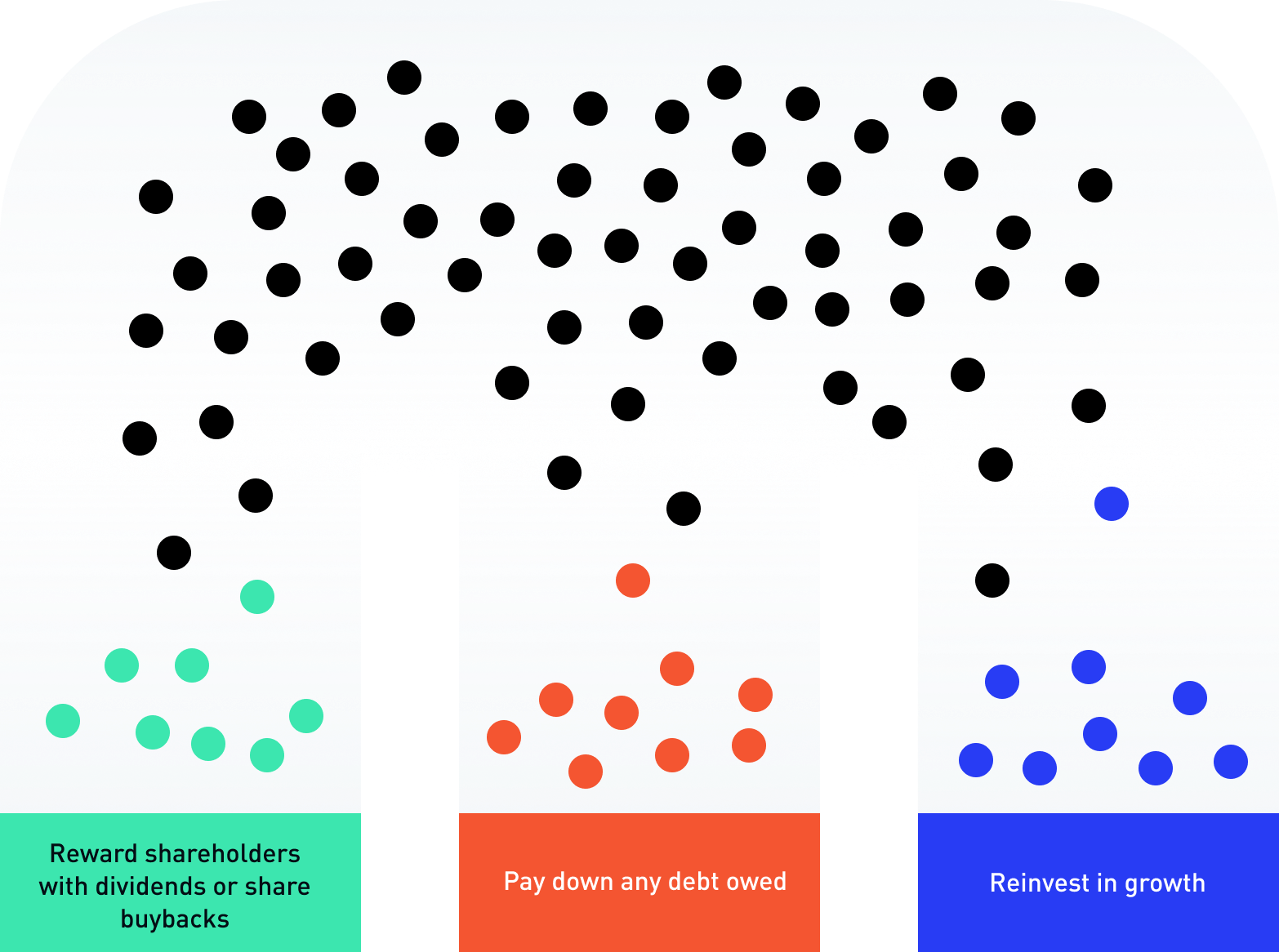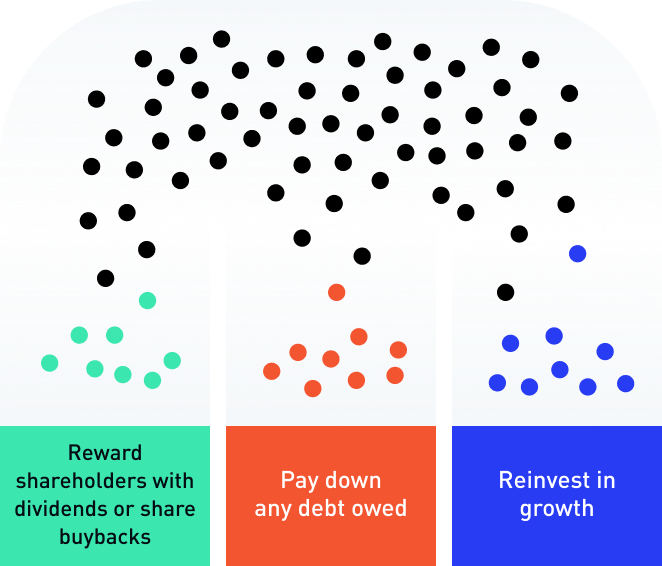What is a Dividend?
A dividend is a payment from a company to its shareholders, giving them a portion of the company’s earnings—Dividends are often paid quarterly and in cash.
🤔 Understanding dividends
Stock market investors may earn a return in two major ways: increases in stock prices and dividends. A dividend is a payment from a company to its shareholders, giving them a portion of the company’s earnings. Dividends are often paid quarterly and in cash. However, companies don’t have to pay dividends — Depending on their financial position or plans, they might reinvest earnings, for example, by hiring more employees or expanding into new product lines. Dividends are typically paid by mature companies, not earlier stage ones.
Utility firms are often mature companies with relatively steady earnings, so they tend to pay dividends to their shareholders. By comparison, younger tech companies generally focus on growth, so they may prefer to invest any earnings back into themselves. For example, NextEra Energy paid a dividend of $1.40 per share in the third quarter of 2020, while GoPro has never paid one as of the third quarter of 2020.
Takeaway
A dividend is like a ripe coconut falling from a tree...
When a coconut falls from a tree, it’s as if the tree is a company, distributing some of its fruit back to you. As an investor, you have a choice of keeping the coconut (and maybe cooking some coconut curry) or planting it in the hopes of growing another tree.
New customers need to sign up, get approved, and link their bank account. The cash value of the stock rewards may not be withdrawn for 30 days after the reward is claimed. Stock rewards not claimed within 60 days may expire. See full terms and conditions at rbnhd.co/freestock. Securities trading is offered through Robinhood Financial LLC.
What is a dividend?
Dividends are how a company can directly reward its shareholders, primarily with cash payments, and they’re one of the primary ways stockholders may generate an investment return. As a shareholder in a company, you’re a part-owner, and if a company pays a dividend, you might receive a proportional piece of the company’s earnings.
However, companies don’t have to pay dividends — they’re distributed at the company’s discretion. And companies may change the frequency and amount of their dividend payments. Early-stage and growth companies typically don’t distribute dividends, preferring to reinvest profits into their own growth, like building new factories or hiring more researchers.
In order for a company to pay a dividend to shareholders, it must be approved by the board of directors. This Jedi Counsel (i.e, board of directors) is made up of advisors to the company selected to represent the shareholders’ interests. The timing of the dividend is decided by the company’s management — whether or not it happens is the board’s decision.
How dividends work for an investor
At the time specified by the company, each shareholder of record is entitled to the dividend. Typically, shares that you own are actually held by your brokerage company, so the brokerage accepts the dividend payment on your behalf and distributes it to your account.
Dividend paying companies
Age can make a difference. Young companies typically spend their money differently than older ones do because they usually have different priorities. Dividends may reflect these differences. Younger companies may still be in a growth phase, so they tend not to pay dividends. More mature companies are more likely to pay dividends.
Growth stocks: When companies have growth opportunities, it may make more sense for them to re-invest their earnings than to offer a payment to shareholders. For example, if a company just created an innovative software program, the short-term goal may be to market it to new clients, so the company might invest in hiring more salespeople rather than paying a dividend to shareholders.
Mature stocks: When companies have scaled and their days of rapid growth are in the rearview mirror, they’re more likely to reward shareholders with dividends vs. investing in further growth.
No matter the company’s age or size, its leaders must decide what’s best for shareholders: paying dividends, investing in growth, or paying down debt. The answer depends on many factors, including a company’s stage of growth.
Important dates linked with dividends
Companies that pay dividends in cash tend to pay them quarterly or on a one-off basis for special dividends. Want to receive the dividend? Make sure you’re a shareholder on the right date — the record date. Here’s the schedule to know:
- Declaration Date: Think of this like a “Save The Date” announcement for a wedding. It’s an announcement by the company’s board of directors about a dividend’s amount, date of record, and payment date.
- Ex-Dividend Date: Circle this date on your calendar. If you haven’t bought the stock by this date, you will not receive the dividend. You’ll have to wait until the next dividend is declared. Since settlement of stock purchases typically takes two days, the ex-dividend date is the day before the record date. You must buy shares prior to the ex-dividend date to get the dividend.
- Record Date: This is the date on which you need to be a shareholder to get the dividend that was declared. There’s usually a delay between your order to buy a stock and when you become an official shareholder (it typically takes two days).Make sure to show up early, like you would at the airport.
- Payment Date: This is when a dividend will be paid to eligible shareholders (i.e., registered shareholders on the Record Date). Depending on the instructions you left with your brokerage account, the money could either appear as cash in your account or be reinvested in the company that issued the dividend.
Impact of dividends on share price
Dividends may send important signals to the market about how well a company is doing. That means dividend decisions may move a stock’s price up or down.
- __How dividends can boost the stock price: __“Bagel Friday” makes the office more fun. Dividends can do a similar thing for shareholders. They’re a celebration of a company’s estimated profits, and can be seen as a reward to shareholders for investing in the company. If a company announces new or increased dividends, it can make the stock more attractive to a specific segment of investors and increase the stock’s appeal. If you’re a long-term investor who’s seeking reliable income from stocks, dividends can be particularly attractive.
- How dividends can hurt the stock price: If a company announces a cut to its dividend, it’s a possible sign that the business is struggling. Companies typically only offer dividends if they’re confident they can maintain their dividend rate, which can rely in part on consistent profits, because they want to avoid the negative signal that comes with cutting a dividend.
Why companies pay dividends
For a company to issue a dividend, it usually is profitable (or at least has a history of profits). Companies have three primary things they can do with their profits:


A company’s management must decide how to handle its earnings. Dividends can be a good option for companies when they believe it’s in the best interest of shareholders. Receiving cash payments is a clear benefit for a segment of its shareholders, but it’s not necessarily the most beneficial option. If a company has significant debt, paying dividends could cause some operational issues, ultimately hurting the business. If a company has a big growth opportunity, shareholders may prefer that it invests in that opportunity instead, for instance, by building more stores.
Interest in dividend-paying investments
The dividend yield is the percent of the share price that gets paid in dividends annually. This metric is often compared to a bond’s coupon rate because both measure the amount of cash income that investors receive, relative to the price of their investment.
Companies with higher dividend yields are generally attractive to more conservative stock investors. Stocks with lower or zero dividend yield are either unprofitable or they might be investing in future opportunities. These are usually categorized as growth stocks, and may have different investment merits than dividend-paying stocks.
New customers need to sign up, get approved, and link their bank account. The cash value of the stock rewards may not be withdrawn for 30 days after the reward is claimed. Stock rewards not claimed within 60 days may expire. See full terms and conditions at rbnhd.co/freestock. Securities trading is offered through Robinhood Financial LLC.
Related Articles
You May Also Like
A health reimbursement arrangement (HRA) is a type of employer-sponsored health benefit where the employer reimburses employees for the medical expenses he or she incurs.
US Government Bonds are debt securities that provide an opportunity to invest in the federal government as it raises capital for spending big and small. Most bonds are issued by the Department of the Treasury at fixed interest rates and carry a significantly lower risk than similar corporate bonds.